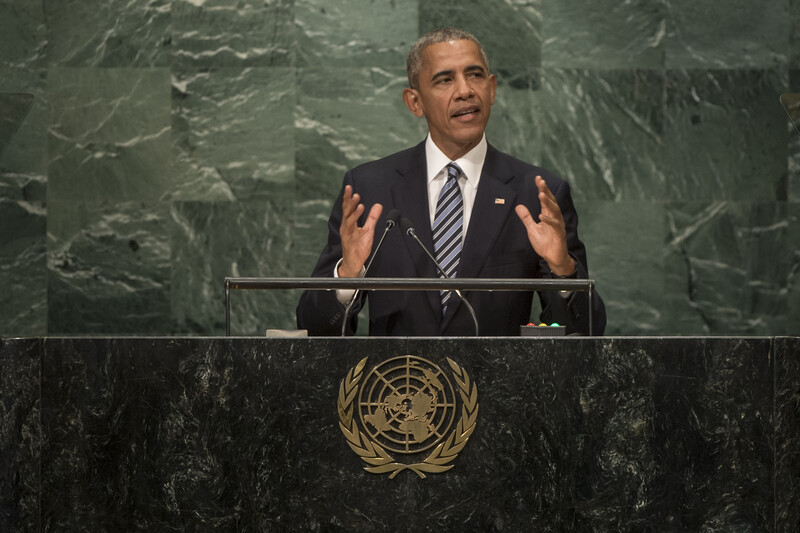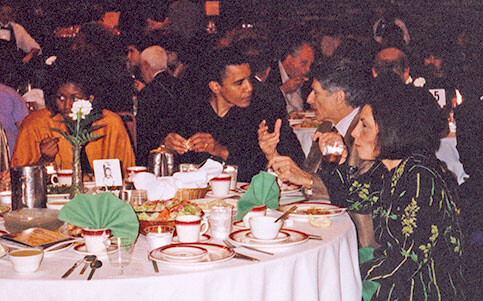Power Suits 21 September 2016

Barack Obama makes his final address to the UN General Assembly in New York as president of the United States, on 20 September 2016.
UN PhotoWhenever a US president prepares to leave office, diplomats and Middle East specialists in think tanks urge him to make a final push for an Israeli-Palestinian “peace” deal.
It is a time-honored Washington ritual.
Given his passing reference to Palestinians and Israelis in his final speech to the UN General Assembly, however, it might seem like there is not much chance of that with Barack Obama.
“Surely, Israelis and Palestinians will be better off if Palestinians reject incitement and recognize the legitimacy of Israel but Israel recognizes that it cannot permanently occupy and settle Palestinian land,” Obama told world leaders gathered in New York on Tuesday.
It was classic Obama: tricky and deceptive language that seeks balance where there is none – equating alleged Palestinian “incitement” with real Israeli colonialism and occupation – and floating lofty goals belied by his actions.
The most glaring of these, of course, is Obama signing off on the record 10-year, $38 billion dollar military giveaway to Israel.
This weapons windfall caps a term during which Obama aided and abetted two devastating Israeli assaults in Gaza, as well as the ongoing siege, and offered Israel every diplomatic protection as it built more settlements on occupied Palestinian land, exceeding even the frenetic pace of colonization during the Bush administration.
Obama is due to meet Israeli Prime Minister Benjamin Netanyahu on the sidelines of the General Assembly on Wednesday, where he will reportedly push Israel to make progress towards the so-called two-state solution.
All Netanyahu will need to do is smile and nod politely for the cameras, knowing that the president has already given away any potential leverage by signing the massive military deal.
But make no mistake: Obama still poses a continuing danger to Palestinian rights as long as he remains in the White House.
Canceling Palestinian rights
In recent weeks, think tankers belonging to the peace process industry have launched a new campaign urging Obama to support a UN Security Council resolution before he leaves office that would enshrine the two-state solution.
But what it would actually do is write into international law an abrogation of Palestinian rights, offering Palestinians no more than a pale bantustan. It would renege on the right to return of Palestinian refugees, a right that the UN has guaranteed. It would, moreover, recognize Israel’s claimed “right” to discriminate against the indigenous Palestinians solely because they are not Jews.
France floated a similar initiative last year, which, as I explained at the time, would have fatally undermined Palestinian rights, but thankfully it went nowhere because the US would not support it.
The most thorough elaboration of this approach now comes from Nathan Thrall of the International Crisis Group.
In a New York Review of Books article this month, Thrall calls a UN resolution laying out the parameters for the partition of historic Palestine into ethnically segregated Palestinian and Jewish states a “last chance” for Obama to “salvage his legacy.”
Thrall claims that “many in the administration” are hoping that this will indeed be Obama’s final act.
“Any resolution the US supports will contain clauses that are difficult for each side to accept,” Thrall writes. “The most troublesome issues for Israel are that the borders will be based on the pre-1967 lines and that the Palestinian capital will be in Jerusalem. The most onerous clauses for the Palestinians relate to recognition of Israel as a Jewish state, the absence of a timeline for Israel’s withdrawal from the West Bank and a resolution of the refugee problem that would rule out anything but symbolic return to Israel.”
He affirms that the resolution would need to “offer some sort of recognition of Israel as a Jewish state,” in effect granting Israel a legal license to be racist.
It would also force on Palestinians what Thrall calls “entirely new concessions to Israel.”
“Settlements that existing Security Council resolutions call to dismantle would gain legitimacy as parts of a potential land swap,” Thrall writes.
Thrall, who enthusiastically supports this approach, is clear about the political realities: “It is a safe bet that on the majority of … issues, a US-supported resolution would favor Israeli positions over Palestinian ones.”
Abrogating UN resolutions
Another figure pushing for a UN resolution is Carl Bildt, the former Swedish foreign minister and high representative – diplomatic speak for unelected ruler – of Bosnia and Herzegovina.
Obama, Bildt writes, “should push for a UN Security Council resolution that establishes new parameters for a future peace accord and replaces UN Security Council Resolution 242, which dates back to the 1967 Six-Day War between Israel and Egypt, Jordan and Syria.”
In other words, Bildt and Thrall want UN resolution 242 – which for all its shortcomings and omissions is at least clear on the “inadmissibility of the acquisition of territory by war” – replaced by a new resolution that actually blesses Israel’s decades of ethnic cleansing and land theft under the banner of “peace” and a “two-state solution.”
Israel’s certain resistance to such an approach should not be taken as evidence that a resolution would somehow be good for Palestinians. Its rejectionism is simply based on long-standing policy that Israel should never be bound by any international rules no matter how ineffectual or favorable they are.
As Thrall acknowledges – and this is also where the grave danger lies for Palestinians – the Palestinian Authority leadership would probably welcome such a resolution, dedicated as Mahmoud Abbas has been to abrogating Palestinian rights when it comes both to refugees and settlements.
Dennis Ross, that stalwart of the Israel lobby who has – absurdly – served as peace envoy for several presidents including Obama, has also weighed in on the potential impact of November’s presidential election on the prospects for such a resolution.
“I suspect that if [Donald] Trump wins, the president would be more inclined to go for a Security Council resolution to try to do something that binds, creates standards for the future that the next president couldn’t undo,” Ross said at a Zionist conference in California last week. “If [Hillary] Clinton wins, I suspect he [Obama] would be more sensitive to her concerns as to whether this helps or hurts her.”
But either way, Ross said, Obama “would like to do something, leave some kind of legacy.”
No friend of Palestinians

Michelle Obama, then Illinois state senator Barack Obama, Edward Said and Mariam Said at a May 1998 Arab community event in Chicago.
Thrall kicks off his New York Review of Books piece by revisiting Obama’s early connections to the Palestinian community, particularly in Chicago: “He had met, dined with, and attended the lectures of such figures as Edward Said, the most famous and eloquent Palestinian critic of the Oslo accords, and he had offered words of encouragement to Ali Abunimah, the Palestinian activist, writer, co-founder of The Electronic Intifada and leading advocate of a one-state solution.”
On the strength of this, Thrall asserts that when the president came to office, “Palestinians looked to Obama as a potentially historic figure capable of ending their occupation.”
That was certainly true for wishful thinkers and the ill-informed. But let me set the record straight. Thrall’s knowledge of Obama’s dining with Said, and his “encouragement” to me, comes from an article I wrote in 2007, when the then senator from Illinois was in the early stages of his presidential primary campaign, titled “How Barack Obama learned to love Israel.”
The point of the article was not to offer hope, but to warn that despite Obama’s connections to the Palestinian community, he had already eagerly adopted the hardline positions of the Israel lobby as he became more politically ambitious.
“Palestinian Americans are in the same position as civil libertarians who watched with dismay as Obama voted to reauthorize the USA Patriot Act, or immigrant rights advocates who were horrified as he voted in favor of a Republican bill to authorize the construction of a 700-mile fence on the border with Mexico,” I wrote about Obama’s ditching of anything resembling a just and principled position on Palestine.
I predicted more than once that Obama would be a disastrous president for the Palestinians and that the hopes so many invested in him were delusional. Sadly, I was right and the think tankers were wrong.
Instead, as I wrote days after Obama’s election in November 2008, Palestinians should invest their efforts in building up their own power and broadening their movement – particularly through boycott, divestment and sanctions – because no US administration would ever support their rights unless compelled to do so.
The best we can hope for now is that in his final months in office Obama will do no more damage to add to his poisoned legacy on Palestine.





Comments
Right
Permalink Nestor Makhno replied on
I remember the enthousiasm in the Netherlands ( where I live ) when Obama was elected. CHANGE, CHANGE and CHANGE. I was very sceptical by then. First see then believe. The speech of Obama in Cairo wpuld have been a landslide if after those words deeds were coming. They weren't . It was all hollow talk. Indeed the US and the west have to be put under immense pressure to change their so called commitment to human rights in actual deeds. And that means a total blockade of Israel. Financials, Trade, traffic and even communications with the world outside of Israel. During the Apartheid in South Africa the US and the UK were among the last which sustained an oppressive regime overthere. With occupied Palestine it wil turn out to be the same. I am ashamed being a citizen in a country which has a policy of hypocrisy. Consequent BDS will pressure all these hypocrites to change their behaviour, although it will take a long time to achieve this. And happy to see that the movement is growing!!
Will Obama’s final act be the liquidation of Palestinian rights?
Permalink Leslie Bravery replied on
Thank you, Ali, for publishing what so clearly needs to be pointed out. World leaders voted for the partition of Palestine knowing full well that the people had been neither consulted nor listened to. Their right to self-determination was ignored. It is the world community's responsibility to defend Palestinian human rights and international law. It is the neglect of both these principles that has led to the present fearsome chaos and terror in the Middle East.
Our leaders must be given no peace until they shoulder their responsibility